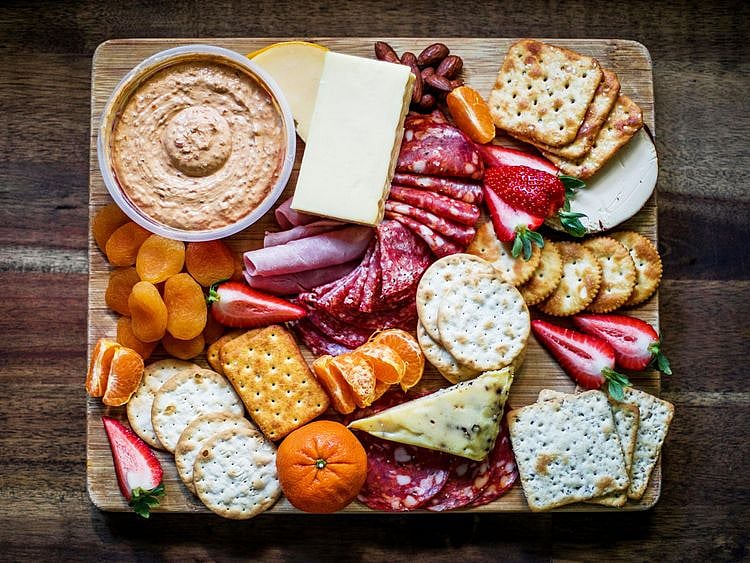Why do we snack? How to snack without ruining your health
Mindful snacking is beneficial, but gorging on sweet, salty or fatty food can be harmful

Do you snack? Who doesn’t! There’s no particular time for a snack, although watching television would rank high. Whether it’s watching a Netflix movie or a cricket match, a bag of chips is often an accompaniment. If you are health conscious, nuts will be your snack of choice. What’s a movie in a theatre without popcorn?
Entertainment always calls for a bit of munching in between. Many people pop peanuts or chips while reading; some even pause while writing to feed their mouths.
Do baby carrots and cucumber slices count? They do. A snack is generally defined as any food eaten between main meals. So chips, popcorn, veggie and fruit bites, cookies, ice cream, cakes, soft drinks and yoghurt are all snacks.
Why do we snack?
Many people snack at least once during the course of a day, and there are several reasons. The most common is a growling stomach a few hours after the last meal. A small bite can help when there’s a dip in energy levels. It can be a craving: chocolates, ice cream and cakes fall into this category.
According to researchers, the various motivations are hunger, food culture, distracted eating, boredom, stress, indulgence, social situations (parties and celebrations) and food insecurity. Snacking is usually impulsive, which is why people reach for processed foods or ready meals without worrying about the health risks.
Is snacking good or bad?
Snacks have always had a bad rap. Why snack if you have had a good meal? It takes care of your nutritional and energy needs. So the in-between-meal food is seen as an indulgence, a needless habit.
Moreover, snacking has been associated with weight gain and poor health. That stems from the belief that these foods are low in quality, with plenty of sugar, salt or fat. Some like chips are fried. All of these are deemed routes to poor health.
Health experts don’t frown on snacking. They say it can be part of a regular diet if the choices are healthy, but poor options can push people into a vortex of health issues.
WHAT’S A SNACK?
What’s eaten between meals is called a snack. It can be all kinds of foods. The main differences are the portion size, consumption time and place, and also why they are consumed. The triggers include hunger, social environment, food availability and stress. People tend to snack when good food is around, even when they’re not hungry.
Snacking behaviour matters, according to The Nutrition Source website of the Department of Nutrition, Harvard T. H. Chan School of Public Health. What’s snacking behaviour? It is “what you snack, why you snack, the frequency of snacking, and how snacks fit into your overall eating plan”.
Snack foods provide instant gratification over healthy habits. A report on The American Dining Creations website said emotion or boredom can lead to eating excess calories and foods high in sugar and fat. “Understanding why we snack and how we can incorporate healthier snacking into our routines can help energise us while building better habits into our lives,” it said.
The Dietary Guidelines for Americans recommend nutrient-dense snacks, such as raw vegetables, fresh fruit, nuts and plain yoghurt. “Munching on something small and healthy keeps you focused, full between meals and feeling good,’ the report in The American Dining Creations said, adding that these foods will help power through a project and can prevent unhealthy cravings.
How to beat snack cravings
Positive snacking habits can be cultivated by consciously choosing nutritious foods over processed foods. It’s not easy, given our exposure to unhealthy snacks and the marketing around it. In 2021, Statista valued the global savoury snacks market at $95.8 billion.
Here are some recommendations from The Nutrition Source, The Mayo Clinic and The American Dining Creations.
Eat regular meals: Meals at regular times will keep you satiated and prevent the need to reach for an unhealthy snack.
Don’t keep snacks at home: Salty and sweet flavours trigger the reward centres of our brain, which means every spike of the feel-good hormone dopamine is followed by a crash. The result is a spike-and-crash cycle, which keeps the craving going. To avoid the trap, don’t keep salty and sweet snacks at home; buy them in limited quantities when you need them.
Avoid processed food: The downsides to eating highly processed foods are well-known. These foods, which are high in sugar, salt, fat, preservatives, artificial flavours and other substances, keep you unsatiated. So they are best avoided.
Eat regular food: Opt for the food cooked at home. Unprocessed foods keep you fuller longer, helping to dodge snacking.
Reduce the triggers: Stress can make you reach for your favourite snack. When stressed, take your mind off food. Distract yourself from food and focus on something else.
Practise mindfulness: If you are not hungry, don’t eat. Be aware of your body’s needs, and stop eating on a whim.
Train your brain: Consciously eat healthier snacks and avoid processed food in packets.
How to treat yourself with a snack
Snacking is unavoidable, given the various triggers. So if you can’t avoid it, reach for the healthy options — whole foods instead of processed foods. Also do not go for second helpings. After all, it’s your health on the line.
Sign up for the Daily Briefing
Get the latest news and updates straight to your inbox
Network Links
GN StoreDownload our app
© Al Nisr Publishing LLC 2026. All rights reserved.